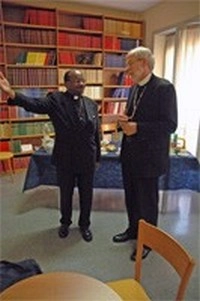- Français
- |
- Booklist
- |
- Week of Prayer
- |
- Links
- Areopagus - a forum for dialogue
- Academic journals
- Acronyms
- Bible tools
- Bibliographies
- Booksellers and publishers
- Churches
- Canadian church headquarters
- Directory of Saskatchewan churches
- Retreat centres
- Saskatchewan church and non-profit agencies
- Ecumenism.net Denominational links
- Anabaptist & Mennonite
- Anglican
- Baptist
- Evangelical
- Independent episcopal
- Lutheran
- Methodist, Wesleyan, and Holiness
- Miscellaneous
- Mormon
- Orthodox (Eastern & Oriental)
- Para-church ministries
- Pentecostal / charismatic
- Presbyterian & Reformed
- Quaker (Society of Friends)
- Roman & Eastern Catholic
- United and uniting
- Documents of Ecumenical Interest
- Ecumenical agencies
- Ecumenical Booklist
- Ecumenical Dialogues
- Glossary
- Human rights
- Inter-religious links
- Justice & peace
- Lectionaries
- Religious news services
- Resource pages
- Search Ecumenism.Net
- |
- Documents
- Ancient & Medieval texts
- Ecumenical Dialogues
- Interreligious
- Anabaptist & Mennonite
- Anglican
- Evangelical
- Lutheran
- Orthodox
- Reformed & Presbyterian
- Roman & Eastern Catholic
- United & Uniting
- Miscellaneous churches
- Canadian Council of Churches (CCC)
- Conference of European Churches (CEC)
- Interchurch Families International Network (IFIN)
- National Council of Churches in Australia (NCCA)
- Lausanne Committee for World Evangelism (LCWE)
- World Council of Churches (WCC)
- Other ecumenical documents
Church traditions
Documents from ecumenical agencies
- |
- Dialogues
- Adventist-Reformed
- African Instituted Churches-Reformed
- Anglican-Lutheran
- Anglican-Orthodox
- Anglican-Reformed
- Anglican-Roman Catholic
- Anglican-United/Uniting
- Baptist-Reformed
- Disciples of Christ-Reformed
- Disciples of Christ-Roman Catholic
- Evangelical-Roman Catholic
- Lutheran-Mennonite
- Lutheran-Mennonite-Roman Catholic
- Lutheran-Reformed
- Lutheran-Roman Catholic
- Mennonite-Reformed
- Mennonite-Roman Catholic
- Methodist-Reformed
- Methodist-Roman Catholic
- Oriental Orthodox-Reformed
- Orthodox-Reformed
- Orthodox-Roman Catholic
- Pentecostal-Reformed
- Prague Consultations
- REC-WARC Consultations
- Roman Catholic-Lutheran-Reformed
- Roman Catholic-Reformed
- Roman Catholic-United Church of Canada
- |
- Quick links
- Canadian Centre for Ecumenism
- Canadian Council of Churches
- Ecumenical Shared Ministries
- Ecumenism in Canada
- Interchurch Families International Network
- International Anglican-Roman Catholic Commission for Unity and Mission
- Kairos: Canadian Ecumenical Justice Initiatives
- North American Academy of Ecumenists
- Prairie Centre for Ecumenism
- Réseau œcuménique justice et paix
- Week of Prayer for Christian Unity
- Women's Interchurch Council of Canada
- World Council of Churches
- |
- Archives
- |
- About us
Lutheran World Federation Welcomes Common Christian Assembly
— Feb. 24, 200624 févr. 2006CHICAGO (ELCA) — Leaders of the Lutheran World Federation (LWF) welcomed an invitation from the World Council of Churches (WCC) to consider entering into plans with other Christian world communions for a common assembly in the next decade. The Rev. Mark S. Hanson, LWF president and presiding bishop of the Evangelical Lutheran Church in America (ELCA), and the Rev. Ishmael Noko, LWF general secretary, were in Porto Alegre, Brazil, for the WCC Ninth Assembly, Feb. 14-23.
The Rev. Samuel Kobia, WCC general secretary, proposed Feb. 15 that the next WCC assembly provide a common platform for the wider ecumenical movement. He mentioned specifically the involvement of the LWF and the World Alliance of Reformed Churches.
“We could envisage together, instead of the many different global assemblies and general conferences organized by the various world communions and other bodies, just one celebration of the search for unity and common witness of Christian churches,” Kobia said.
Hanson said, “One of the tensions in the global ecumenical movement today concerns the role of the Christian world communions and confessional bodies, and (whether) they are finally contributing toward the greater unity of the church or taking energy away from the ecumenical movement.”
“Being Lutheran is to be ecumenical. I can’t read the Augsburg Confession without thinking that this was a proposal for the unity of the church, at least the Western church at that time,” said Hanson. The Augsburg Confession is a foundational document of the Lutheran Church.
Hanson stressed the need to rethink constantly “the function of these assemblies, in our life together, and in our witnessing in the world.” He wondered whether the focus on ecumenism or Lutheran identity through the current assembly rhythm of six to seven years was the most effective way to tend to “our relationship together” or to “our witness in our work for deeper unity in the body of Christ.”
Planning such assemblies would call for “careful talks” and openness to addressing “complicated questions” in order to ensure the contribution of all the Christian traditions represented in the Christian world communions and the WCC, Hanson said, asking particularly that the involvement of the world Orthodox community be considered.
Noko said, “Holding assemblies within the space of WCC assemblies would neither lead to the dissolution of the LWF nor the Christian world communions’ assemblies, but would strengthen the ecumenical commitment of the participating communions and build theological and ecclesial bridges nurtured by the Holy Spirit.”
The issue of coordinated assemblies under the WCC has been on the agenda of LWF governing bodies for several years. “The LWF Council in September 2005 decided to explore seriously the possible coordination of the meetings of governing bodies of the WCC and Christian world communions,” Noko said.
The LWF is a global communion of Christian churches in the Lutheran tradition. It has 140 member churches in 78 countries all over the world, with a total membership of 66.2 million. The ELCA is a member of the LWF and the WCC, both based in Geneva, Switzerland. The WCC includes more than 340 churches, denominations and church fellowships in more than 100 countries and territories throughout the world, representing some 550 million Christians.
* Susanne Buchweitz, based in Porto Alegre, Brazil, reported for Lutheran World Information, the LWF’s information service.

 Permanent link: ecumenism.net/?p=4844
Permanent link: ecumenism.net/?p=4844
Categories: ELCA News

 Lien permanente : ecumenism.net/?p=4844
Lien permanente : ecumenism.net/?p=4844
Catégorie : ELCA News

